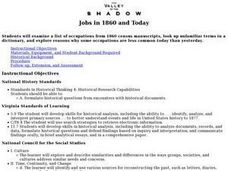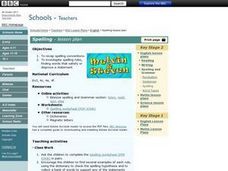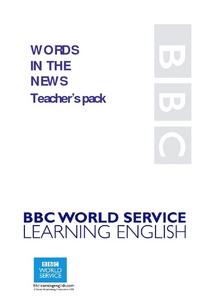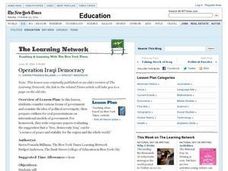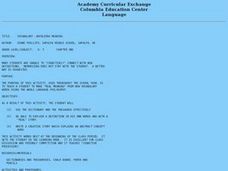Curated OER
Ballet and Classical Music
Fourth graders explore ballet. In this dance and music humanities lesson, 4th graders practice ballet positions and play a card game using French ballet vocabulary. Students count beats in rhythm patterns and listen to classical music...
Visa
Hall of Fame Lesson Module — Financial Football
Kick off an engaging review on personal finance with an online football game. Financial Football incorporates both football strategies and economic knowledge in an interactive format, allowing future CFOs to answer a variety of questions...
Curated OER
Down for the Count?
The New York Times article “Supreme Court, Split 5-4, Halts Florida Count in Blow to Gore” provides the opening to an assessment of the United States Supreme Court decision in the case of the 2000 presidential election. Assuming the...
Curated OER
Jobs in 1860 and Today
Students compare occupations during the 19th century with the 21st century using information from 19th century census information.
Curated OER
Playing with Language: Tall Tales and Codes
Pupils interpret and identify the elements of folktales, with an emphasis on tall tales, in this lesson. Students utilize brainstorming techniques to list ways people communicate. Pupils also read and create a time line and present...
Curated OER
Olympic Games Snowboard Design: Winter Sports, Snowboarding, Graphic Arts, Global Cultures
Students gather information about a country and work as a team. They use their knowledge to create a snowboard design that represents the country they pick. They explore locations, languages, flags, and emblems for various countries.
Curated OER
An Illustrated Guide to the Late 1800's
Eleventh graders investigate the time of the late 1800's. They conduct research using a variety of resources that could include the internet. Students create an alphabetized encyclopedia of important historical people of the time period.
Curated OER
Comparison of Juan Bautista de Anza and George Washington
Fifth graders discover that Anza and Washington lived at the same time but on opposite sides of the American Continent. They identify differences and similarities in their lives. They present the data in an illustrated time line
Curated OER
"Pleading the Fifth" Self-Incrimination and the Fifth Amendment
Pupils examine how the Fifth Amendment protects against self-incrimination. They apply it to hypothetical situations by role playing as judges.
Curated OER
Stereotypes
Students analyze then sort a given list of words by selected categories about stereotypes. They complete a list of activities then write their opinion about national stereotypes to present to the class.
Curated OER
Spelling Lesson Plan
Review basic spelling rules with your elementary schoolers. Focus in on the spelling of words with a specific prefix. In this spelling lesson, learners use an interactive whiteboard lesson to learn prefixes such as de, sub, re, and pre....
Curated OER
Words in the News Smoking Ban- 15 February 2006
Students complete vocabulary building exercises before reading an online article. They complete worksheets and an online quiz. They focus on relaltive clauses on the final worksheet. They write a letter about second hand smoke in a...
Curated OER
Getting into Hot Water
Students discuss the effect of global warming on bodies of water after reading "An Icy Riddle as Big as Greenland" from The New York Times. Students work in groups to research topics related to global warming and Greenland's ecology...
Curated OER
Straining to Understand Viruses
Students examine the differences among the strains of deadly viruses and create research-based visual displays about the origins of different strains, transmission, symptoms, treatments and historic impact of specific viruses.
Curated OER
Showing Good Taste
Students distinguish the important elements of well-written restaurant reviews by analyzing and evaluating reviews from The New York Times and by writing their own reviews of favorite dining locations.
Curated OER
Fighting Fire With Satire
Students consider satire in the news by exploring various sources of "fake news," and then creating their own political satire in the form of a skit, news article, or cartoon.
Curated OER
Bureau Stats
Students explore the role of bureaucracy in United States government; they then examine the history, leadership, organization, and goals of executive agencies.
Curated OER
Operation Iraqi Democracy
In this lesson, students consider various forms of government and examine the idea of political sovereignty, then prepare outlines for oral presentations on international models of government. For homework, they write response papers...
Curated OER
Haunting Music
Students discover music that was inspired by the spooky and bizarre. In this music of Hector Berlioz and Camille Saint-Saens activity, students identify elements of music and listen to the Symphonie Fantastique and Danse Macabre....
Curated OER
ACE Expert English Homework
In this positions learning exercise, students read descriptions of where the ball is around a box and then draw pictures of where a cat is beside a chair. Students draw 8 pictures and answer 16 position questions.
Curated OER
Vocabulary - Unfolding Meaning
Students write the "word for the day" onto a note card. They add a definition, discuss in class and file the card in their own metal box. At the end of the week students play a game with the words from that week.
Curated OER
Computers: Caught in the Web
Young scholars conduct Internet research about various websites noting the design and appearance of them. Working in small groups, they compare and contrast the sites and share their opinions of them with classmates. They also examine...
Curated OER
Home Bound
Students consider the detainment of students by the Immigration and Naturalization Service and, imagining that they are detained Students, compare and contrast what life as a child is like in their homelands versus in I.N.S. custody.
Curated OER
Substance Use, or Abuse?
Young scholars identify the medicinal benefits, and ill effects, of a variety of controlled substances. They determine whether or not they think hallucinogens should be researched for possible medicinal purposes.





